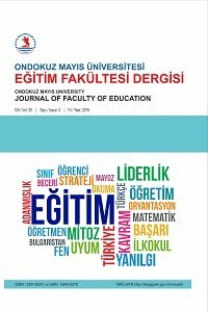PEDAGOJİK FORMASYON PROGRAMI ÖĞRETMEN ADAYLARININ MESLEKİ TUTUM VE ÇAĞDAŞ ÖĞRETMEN ALGILARI
Öğretmenlik Mesleği, Tutum, Pedagojik Formasyon, Öğretmen Nitelikleri.
THE PERCEPTIONS OF TEACHERS’ TOWARDS PROFESSIONAL ATTITUDE CONTEMPORARY TEACHERS QUALIFICATIONS
___
- AÇIKGÖZ Ün Kamile (2003). Aktif Öğrenme, İzmir: Eğitim Dünyası Yayınları.
- AYTUNGA Oğuz ve TOPKAYA Nursel (2008). “Orta Öğretim Alan Öğretmenliği Öğrencilerini Öğretmen Özyeterlik İnançları ile Öğretmenliğe İlişkin Tutumları”, Uluslararası Hakemli Sosyal Bilimler e-Dergisi, (ET: 04.03.2012).
- http://www.akademikbakis.org/14/ozyeter.pdf,
- BAŞÇİFTÇİ Fatih, YANPINAR Onur ve ERGÜL Murat (2011). “Öğretmen Adaylarının İncelenmesi: Selçuk Üniversitesi Örneği”.,International Educational Technology Conference “IETC”, 25-27 Mayıs 2011, İstanbul. http://www.iet-c.net/publications/ietc2011-2.pdf, (ET: 14.03.2012).
- BOZDOĞAN Aykut Emre, AYDIN Davut ve YILDIRIM, Kasım (2007). “Öğretmen Adaylarının Öğretmenlik Mesleğine İlişkin Tutumları”, Ahi Evran Üniversitesi Kırşehir Eğitim Fakültesi Dergisi (KEFAD), Cilt 8, Sayı 2, s.83-97. http://kefad.ahievran.edu.tr/archieve/pdfler/Cilt8Sayi2/JKEF_8_2_200 7_83_97.pdf, (ET: 21.03.2012).
- CAN Şendil (2010). “Tezsiz Yüksek Lisans Öğrencilerinin Öğretmenlik Mesleğine Yönelik Tutumları”, Muğla Üniversitesi Sosyal Bilimler Enstitüsü http://www.sbed.mu.edu.tr/index.php/asd/article/view/333/325, (ET: 07.04.2012). (İLKE) Bahar 2010 Sayı 24.
- CARTER Glenda & NORWOOD S. Kalen. (1997) “The Relationship Between Teacher And Student Beliefs About Mathematics”, School Science and Mathematics, 97(2), p. 62-67.
- ÇELİKÖZ Nadir VE ÇETİN Filiz (2004). “Anadolu Öğretmen Lisesi Öğrencilerinin Öğretmenlik Mesleğine Yönelik Tutumlarını Etkileyen Etmenler”, http://dhgm.meb.gov.tr/yayimlar/dergiler/Milli_Egitim_Dergisi/162/c elikoz-cetin.htm, (ET:16.04.2012). S. 162, s. 136-145.
- ÇELİKTEN Mustafa, ŞANAL Mustafa ve YENİ Yeliz (2005). “Öğretmenlik Mesleği ve Özellikleri”, Sosyal Bilimler Enstitüsü Dergisi Sayı: 19 Yıl: 237.%20syf.). pdf, (ET: 13.05.2012). (207
- DERMAN Ayşegül (2007). Kimya Öğretmeni Adaylarının Öz Yeterlik Algıları ve Öğretmenlik Mesleğine Yönelik Tutumları, Selçuk Üniversitesi Fen Bilimleri Enstitüsü, y.d.t., Konya.
- ERDEN Münire (1995). Öğretmen Adaylarının Öğretmenlik Sertifikası Derslerine Yönelik Tutumları. HÜ Eğitim Fakültesi Dergisi, 11, http://www.efdergi.hacettepe.edu.tr/199511M%C3%9CN%C4%B0R E%20ERDEN.pdf, (ET: 24.04.2012).
- ERDEM Rıza Ali, GEZER Kudret ve ÇOKADAR Hulusi (2005). “Ortaöğretim Fen-Matematik ve Sosyal Alanlar Öğretmenliği Tezsiz Yüksek Lisans Öğrencilerinin Öğretmenlik Mesleğine İlişkin Tutumları”, XIV. Ulusal Eğitim Bilimleri Kongresi. 28-30 Eylül, Kongre Kitabı I. Cilt, 471-477, Denizli.
- GORDON Thomas (2004). Etkili Öğretmenlik Eğitimi, (Çeviren: Emel Aksay), İstanbul: Sistem Yayıncılık.
- GÜRBÜZ Hasan ve KIŞOĞLU Mustafa (2007). “Tezsiz Yüksek Lisans Programına Devam Eden Fen-Edebiyat ve Eğitim Fakültesi Öğrencilerinin Öğretmenlik Mesleğine Yönelik Tutumları (Atatürk Üniversitesi Örneği)”, Erzincan Eğitim Fakültesi Dergisi 9(2), http://eefdergi.erzincan.edu.tr/index.php/EFDERGI/article/view/708/5 93 , (ET: 06.05.2012).
- GÜDEK Bahar (2007). Eğitim Fakültesi Müzik Eğitimi Anabilim Dalı 1. Ve 4. Sınıf Öğrencilerinin Müzik Öğretmenliği Mesleğine Yönelik Tutumlarının Öğrenciye Ait Değişkenler Açısından İncelenmesi, Gazi Üniversitesi, Eğitim Bilimleri Enstitüsü, y.d.t., Ankara.
- KAĞITÇIBAŞI Çiğdem (1999). Yeni İnsan ve İnsanlar, İstanbul: Evrim Yayınevi.
- KATKAT Dursun ve MIZRAK Orcan (2003). “Öğretmen Adaylarının Pedagojik Eğitimlerinin Problem Çözme Becerilerine Etkisi”, Milli Eğitim http://dhgm.meb.gov.tr/yayimlar/dergiler/Milli_Egitim_Dergisi/158/k atkat.htm, (ET: 11.05.2012). :158, Ankara.
- KAYA Ali ve BÜYÜKKASAP Erdoğan (2005). “Fizik Öğretmenliği Programı Öğrencilerinin Profilleri, Öğretmenlik Mesleğine Yönelik Tutum Ve Endişeleri: Erzurum Örneği”, Kastamonu Eğitim Dergisi, 13(2). 14.05.2012). (ET:
- KILIÇ Abdurrahman ve SEVEN Serdal (2002). Konu Alanı Ders Kitabı İncelemesi, Ankara: Pegem A Yayıncılık.
- MCDIARMID G. Williamson (1990). 'Challenging Prospective Teachers' Beliefs During Early Field Experience: A Quixotic Undertaking?', Journal of Teacher Education, 41(3):12-20.
- MEMİŞOĞLU Salih Paşa (2006). “Nasıl Bir Öğretmen?” Orta Öğretime Yeniden Yapılanma Sempozyumu. MEB Talim Terbiye Kurulu Başkanlığı, 20-22 Aralık 2004 Bildiriler Kitabı, 334-338, Ankara.
- MORGİL İnci, SEÇKEN Nilgün ve YÜCEL A. Seda (2004). “Kimya Öğretmen Adaylarının Öz-Yeterlik İnançlarının Bazı Değişkenler Açısından İncelenmesi”, Balıkesir Üniversitesi Fen Bilimleri Enstitüsü Dergisi, 6(1). http://fbe.balikesir.edu.tr/dergi/20041/BAUFBE2004-1-7.pdf, 18.05.2012). (ET:
- ÖZDEMİR M. Çağatay (Editör) (2004). Öğretmenlik Mesleğine Giriş, Ankara: Asil Yayın Dağıtım.
- ÖZDER Hasan, KONEDRALI Güner ve ZEKİ Canan Perkan (2010). “Öğretmen Tutumlarının Çeşitli Değişkenler Açısından İncelenmesi”, Kuram ve Uygulamada http://hasanozder.com/files/ogretmenlik_tutum.pdf, (ET: 22.05.2012). Yönetimi, Yönelik Eğitim Cilt 16, Sayı 2.
- ÖZKAN Özlem, TEKKAYA Ceren ve ÇAKIROĞLU Jale (2002). “Fen Bilgisi Aday Öğretmenlerinin Fen Kavramlarını Anlama Düzeyleri, Fen Öğretimine Yönelik Tutum ve Öz-yeterlik İnançları”, V. Ulusal Fen Bilimler http://www.fedu.metu.edu.tr/ufbmek- 5/netscape/b_kitabi/PDF/OgretmenYetistirme/Bildiri/t300.pdf, 26.05.2012). Eğitimi ve Matematik Kongresi, ODTÜ-Ankara (ET:
- SARACALOĞLU A. Seda vd. (2004). “Öğretmen Adaylarının Mesleğe Yönelik Tutumlarını Etkileyen Faktörler”, Çağdaş Eğitim, 29(311), 16–27. http://kisi.deu.edu.tr//oguz.serin/yeni/cagdas_egitim.pdf, (ET: 10.05.2012).
- SAYIN Saime (2005).” Öğretmen Adaylarının Öğretmenlik Mesleğine Karşı Tutumları ve Mesleki Benlik Saygılarının İncelenmesi”, Eğitim Araştırmaları, 19, 272-281. http://www.ejer.com.tr/0DOWNLOAD/pdfler/eng/518658921.pdf, (ET: 25.05.2012).
- SCHLECHTY C. Philip (2005). Okulu Yeniden Kurmak, (Çeviren: Yüksel Özden). Ankara: Nobel Yayınları.
- ŞAHİN F. Sülen (2010). “Teacher Candidates' Attitudes Towards Teaching Profession And Life Satisfaction Levels”, Procedia Socialand Behavioral Sciences 2. http://ac.els-cdn.com/S1877042810008852/1-s2.0- S1877042810008852-main.pdf?_tid=ee57a454-34d4-11e3-8e5c- 00000aab0f6c&acdnat=1381757668_4712b2022b4daa59129ef760998 e9fe3, (ET: 19.03.2012).
- ŞİMŞEK Hüseyin (2005). “Ortaöğretim Alan Öğretmenliği Tezsiz Yüksek Lisans Programına Devam Eden Öğrencilerin Öğretmenlik Mesleğine Yönelik Tutumları”, Yüzüncü Yıl Üniversitesi Eğitim Fakültesi Dergisi. http://efdergi.yyu.edu.tr/makaleler/cilt_II/ozetler/huseyin_simsek.htm, (ET: 17.03.2012). 2(1).
- TAN Şeref, SEVİNÇ Ömer Seyfettin ve AKCAN Kadir (2005). “Çağdaş Öğretmen Nitelikleri Hakkında Öğretmen Adaylarının Görüşleri”, Celal Bayar Üniversitesi, Sosyal Bilimler Enstitüsü Sosyal Bilimler Dergisi, Sayı: 1, cilt 3 Bahar, s. 97-115.
- TANEL Rabia, ŞENGÖREN Kaya Serap ve TANEL Zafer (2007). “Fizik Öğretmen Adaylarının Öğretmenlik Mesleğine İlişkin Tutumlarının Farklı Değişkenler Açısından İncelenmesi”, Pamukkale Üniversitesi Eğitim Fakültesi Dergisi, 2(22). http://pauegitimdergi.pau.edu.tr/Makaleler/1223389191_Rabia%20Ta nel2,%20Serap%20Kaya%20%C5%9Eeng%C3%B6ren3,%20Zafer% 20Tanel4.pdf, (ET: 22.04.2012).
- TAVŞANCIL Ezel (2002). Tutumların Ölçülmesi ve SPSS ile Veri Analizi, Ankara: Nobel Yayınevi.
- TEMİZKAN Mehmet (2008). “Türkçe Öğretmeni Adaylarının Öğretmenlik Mesleğine Yönelik Tutumları Üzerine Bir Araştırma”, Türk Eğitim Bilimleri Dergisi, 6(3). http://www.tebd.gazi.edu.tr/arsiv/2008 _cilt6/sayi_3/461-486.pdf, (ET: 15.05.2012).
- TERZİ Ali Rıza ve TEZCİ Erdoğan (2007). “Necatibey Eğitim Fakültesi Öğrencilerinin Öğretmenlik Mesleğine İlişkin Tutumları”, Kuram ve Uygulamada Eğitim http://www.pegem.net/dosyalar/dokuman/4355-20110603122345-4- Yönetimi terzi.pdf, (ET: 05.04.2012). Güz 2007, Sayı 52.
- YÜKSEL Sedat (2004). “Tezsiz Yüksek Lisans Programının Öğrencilerin Öğretmenlik Mesleğine İlişkin Tutumlarına Etkisi”, Uludağ Üniversitesi http://ucmaz.home.uludag.edu.tr/PDF/egitim/htmpdf/2004-17(2)/355- 379.pdf, (ET: 12.03.2012). Fakültesi Dergisi, 17(2).
- ISSN: 1300-302X
- Yayın Aralığı: 2
- Başlangıç: 1986
- Yayıncı: Ondokuz Mayıs Üniversitesi Eğitim Fakültesi
THE EFFECT OF COGNITIVE AND COMPENSATION STRATEGY INSTRUCTION ON READING COMPREHENSION SKILL
Dilek ÇAKICI, Okt İsmail YAMAN
ÖĞRETMENLERİN, OKULLARINA İLİŞKİN ÖRGÜTSEL İMAJ ALGILARININ BAZI DEĞİŞKENLER AÇISINDAN İNCELENMESİ
Celal Teyyar UĞURLU, Neslihan CEYLAN
Elif ÖZTÜRK YILMAZTEKİN, Refika OLGAN
ÖĞRETMEN MEMNUNİYET DÜZEYLERİ VE HAYAL ETTİKLERİ EĞİTİM ORTAMI
Özlem ÖZÇAKIR SÜMEN, Kaya Tuncer ÇAĞLAYAN
İLKÖĞRETİM ÖĞRENCİLERİNİN (4. VE 5. SINIF) DÜNYASINDAKİ CANLI VE CANSIZ KAVRAMINA CİNSİYETİN ETKİSİ
Mehmet Nuri GÖMLEKSİZ, Ayşe ÜLKÜ KAN
İLKÖĞRETİM 4. SINIF FEN VE TEKNOLOJİ PROGRAMINDAN YANSIMALAR “ADANA İLİ ÖRNEĞİ”
Mehmet KARAKUŞ, Fadime MENGİ US
PEDAGOJİK FORMASYON PROGRAMI ÖĞRETMEN ADAYLARININ MESLEKİ TUTUM VE ÇAĞDAŞ ÖĞRETMEN ALGILARI
